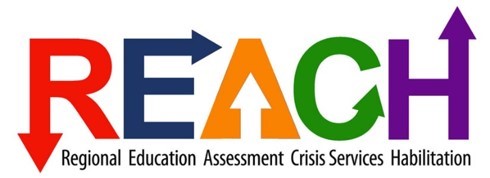- Select a Section for More Information
- Office of Crisis and Supports Services
- Mobile Crisis
- Community Based Stabilization
- CSUs (Crisis Stabilization Unit)
- Emergency Services
- REACH
- Crisis Data Platform
- The Marcus Alert System

REACH Program – Crisis Supports for youth or an adult with a developmental disability.
What is REACH?
REACH is an acronym that stands for Regional Education Assessment Crisis Services Habilitation. The REACH program is a component of the Virginia Crisis Continuum of Care. It was established to serve individuals diagnosed with a developmental disability (DD) who reside within the Commonwealth of Virginia. REACH services are available within each of the Commonwealth’s five regions: Region I (Western), Region II (Northern), Region III (Southwestern), Region 4 (Central), and Region 5 (Eastern).
The REACH program offers 24/7 mobile crisis response, short term crisis stabilization services, including residential (crisis therapeutic home) and non-residential (services are provided in community locations where the individual lives, works, and participates in services or socializes), and prevention supports to individuals that are experiencing a behavioral health or behavior-related crisis event(s).
REACH Program Eligibility Requirements
Assessment of REACH program eligibility is conducted at the Regional level. No qualifying individual will be turned away due to an inability to pay for services. The REACH program does not serve individuals who are actively under the influence or detoxing from substance use, including alcohol. REACH personnel do not pre-screen individuals for inpatient admission. Any individual who meets qualifying eligibility criteria can access REACH services at no cost.
Program Contact Information
REACH Crisis Line by Region:
- Region 1
- Phone: 888-908-0486
- Fax: 434-202-5249
- Email: reach.managers@regionten.org
- Region 2
- Phone: 855-897-8278
- Fax: 571-477-2275
- Email: adrienne.randall@eastersealsucp.com
- Region 3
- Phone: 855-887-8278
- Fax: 540-267-3403
- Email: info@swvareach.org
- Region 4
- Phone: 833-968-1800
- Fax: 804-562-5135
- Email: Tammy.BecoatEclou@rbha.org
- Region 5
- Phone: 888-255-2989
- Fax: N/A
- Email: reachmanagers@wtcsb.org
REACH Services
- Mobile Crisis Response: 24/7 crisis assessment and intervention designed to address and resolve crisis situations for individuals who have a Developmental Disability (DD) and are experiencing a crisis event of a behavioral and/or psychiatric nature.
- Community-Based Crisis Stabilization Services: The goal of Community Stabilization services is to stabilize the individual within their community. These services are available 24/7 to provide for short-term assessment, crisis intervention, and care coordination to individuals experiencing a behavioral health crisis. Services may include brief therapeutic and skill building interventions, engagement of natural supports, interventions to integrate natural supports in the de-escalation and stabilization of the crisis, and coordination of follow-up services.
- Crisis Therapeutic Homes: The Crisis Therapeutic Home (CTH) is a residential crisis stabilization component of the REACH program. It is designed for situations where community-based crisis services or supports are ineffective or clinically inappropriate. The CTH is not intended for long-term residence or respite. Instead, it provides stabilization for individuals in crisis, planned prevention, or as a step-down from state hospitals, training centers, or jails. Priority is given to crisis admissions over planned prevention or step-down admissions.
- Crisis Education and Prevention Plan (CEPP): A plan which provides a concise, clear, and realistic set of supportive interventions to prevent or de-escalate a crisis and assist an individual who may be experiencing a behavioral loss of control. Customized training is provided for both the individual and their support network. The training focuses on specific plans and strategies to help the person handle early signs of distress, preventing crises from happening. By doing this, the chances of needing to move the person out of their home for care are greatly reduced.
- Training and Education: REACH provides training and education to the larger community (e.g. CSBs, families, providers, law enforcement, hospitals) both on REACH services and on topics which are pertinent to the population which REACH serves.
Below are several downloadable standardized documents, referral forms, and the REACH Program Standards.
REACH Subject Matter Expert:
Sharon Bonaventura, MA, LBA
- 434-960-0427
- sharon.bonaventura@dbhds.virginia.gov